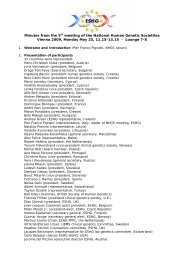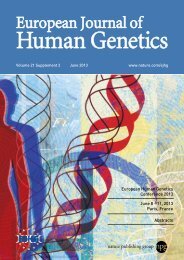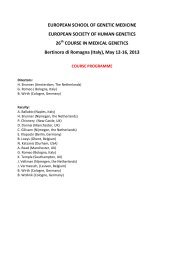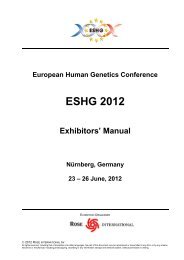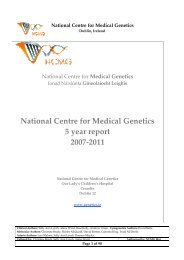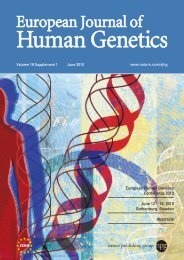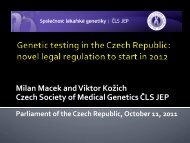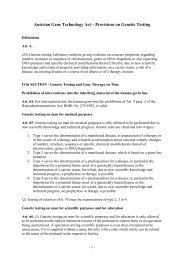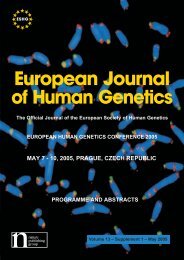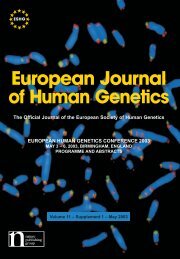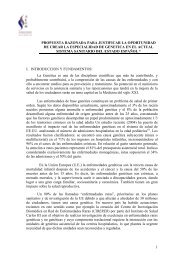2008 Barcelona - European Society of Human Genetics
2008 Barcelona - European Society of Human Genetics
2008 Barcelona - European Society of Human Genetics
You also want an ePaper? Increase the reach of your titles
YUMPU automatically turns print PDFs into web optimized ePapers that Google loves.
EMPAG Posters<br />
their own home .<br />
It emerged from the analysis that different approaches were taken by<br />
participating parents before they reached a reproductive decision, and<br />
while several factors influenced this, the first diagnosis <strong>of</strong> CF in the<br />
family had a particularly significant influence. Parents in this study appeared<br />
to have undergone an adaptation process during which they<br />
overcame the initial shock <strong>of</strong> a CF diagnosis in their child, developed<br />
a more positive outlook based largely on their own experiences <strong>of</strong> CF,<br />
and then felt able to address further reproductive decisions . However,<br />
following adaptation, some differences between the sexes emerged .<br />
Women frequently acknowledged that the decisions remained fluid<br />
and dynamic, whereas men tended to portray a more rigid standpoint<br />
once a particular decision had been reached . Furthermore, men and<br />
women <strong>of</strong>ten felt that they had inherently different roles in reproductive<br />
decision making, with the ultimate decision resting with the woman . In<br />
most cases, couples felt that the decision was made together, without<br />
significant external influence.<br />
EP01.06<br />
Uptake <strong>of</strong> genetic counselling and prenatal diagnostic services<br />
for cF in ireland<br />
D. M. Lambert1,2 , M. Morgan1 , S. Lynch2 ;<br />
1 2 Children’s Univeristy Hospital, Dublin, Ireland, National Centre for Medical<br />
<strong>Genetics</strong>, Dublin, Ireland.<br />
Cystic fibrosis (CF) is a common recessive condition in Ireland with 1<br />
in 19 carriers and 1 in 1440 affected . From January 2004 to July 2007,<br />
76 patients were sent appointments for genetic counseling for CF: 23<br />
(30%) were routine referrals from the CF clinic for a new CF family;<br />
and 53 (70%) were GP referrals for positive family history .<br />
For GP referrals the risk <strong>of</strong> being a CF carrier was: CF affected (3 .7%),<br />
known carrier (20 .7%), 2/3 risk (22 .6%), ½ risk (41 .5%), ¼ risk (7 .5%),<br />
population risk (1 .9%) . 66% had a partner while 34% wanted to discuss<br />
carrier status before finding a partner. Those at higher risk <strong>of</strong><br />
being a carrier were more likely to wait until they had a partner before<br />
being referred . Five <strong>of</strong> 53 (9%) were found to be at a 1 in 4 risk <strong>of</strong> CF .<br />
Of 25 families with a child with CF, 21 <strong>of</strong> the 23 referred attended the<br />
genetics appointment . Of the 30 families at 1 in 4 risk <strong>of</strong> CF, 15 (50%)<br />
remained childless since . For 26 <strong>of</strong> 30 couples a molecular prenatal<br />
diagnosis was available, with 12 having a pregnancy and 5 (42%) a<br />
prenatal test . 4 indicated interest in pre-implantation genetic diagnosis<br />
(PGD) . 6 families (20%) had members seen for cascade screening although<br />
the <strong>of</strong>fer was made to all . The uptake for prenatal diagnosis and<br />
screening <strong>of</strong> family members is lower than other <strong>European</strong> countries,<br />
perhaps reflecting the illegality <strong>of</strong> termination and PGD in Ireland.<br />
EP01.07<br />
Reproductive decision making in cF carrier couples; an<br />
explorative study in couples without an affected child<br />
J. Myring 1 , R. Sayers 2 , T. Roberts 3 , D. Scotcher 3 , M. McAllister 4,3 ;<br />
1 Clinical <strong>Genetics</strong>, NHS Tayside, Dundee, United Kingdom, 2 Sheffield Clinical<br />
<strong>Genetics</strong> Service, Sheffield Children’s NHS Foundation Trust, Sheffield, United<br />
Kingdom, 3 Regional <strong>Genetics</strong> Service and Medical <strong>Genetics</strong> Research Group,<br />
CMMC NHS Trust and University <strong>of</strong> Manchester, Manchester, United Kingdom,<br />
4 Nowgen (A Centre for Genetic Healthcare), Manchester, United Kingdom.<br />
We report on part <strong>of</strong> a larger research project which uses qualitative<br />
methodology to explore the reproductive decision making process in<br />
CF carrier couples . 5 males and 7 females from CF carrier couples<br />
without an affected child were interviewed individually in their home, to<br />
explore both male and female perspectives <strong>of</strong> the reproductive decision<br />
making process .<br />
Data analysis revealed that while couples may consider different scenarios,<br />
the decision making process remains largely unstructured . Personal<br />
experiences <strong>of</strong> CF were an important factor: Individuals had to<br />
weigh up their perception <strong>of</strong> the physical difficulties <strong>of</strong> CF, the fact that<br />
CF is not an intellectually disabling condition, and their attachment to<br />
someone with CF . Individuals may not fully engage with their risk <strong>of</strong><br />
having a child with CF during the decision making process, which may<br />
lead them to be unprepared for bad news .<br />
Men and women may play different roles within the reproductive decision<br />
making process . Men appeared to take on a supportive role, tending<br />
to agree with their partner . Women felt that the decision was mutual<br />
and intuitive, possibly due to this support from their partner . Both<br />
partners felt that ultimately, the decision was primarily the woman’s;<br />
influenced by the physical attachment to pregnancy and possibly their<br />
role as primary carer .<br />
CF carrier couples who have a healthy child in their first at-risk pregnancy<br />
may feel that they have “used up their luck”, which may lead to<br />
a decision to limit family size .<br />
EP01.08<br />
Ancestry-based preconceptional cF and HbPs carrier screening<br />
in a multi-ethnic population: attitude and participation,<br />
psychological outcomes, reproductive intentions and<br />
satisfaction<br />
P. Lakeman, A. M. C. Plass, L. Henneman, P. D. Bezemer, M. C. Cornel, L. P.<br />
ten Kate;<br />
VU University Medical Center, Amsterdam, The Netherlands.<br />
Objective: to investigate attitude and participation, psychological outcomes,<br />
reproductive intentions and satisfaction in ancestry-based preconceptional<br />
carrier screening for cystic fibrosis (CF) and hemoglobinopathies<br />
(HbPs) .<br />
Methods: 9,453 individuals were <strong>of</strong>fered carrier-testing, which was<br />
conditional on survey-participation . Eligible for test-participation were<br />
invitees who were planning a pregnancy with their partner . Both partners’<br />
ancestry determined eligibility for the CF and/or HbP-test(s) . Data<br />
were gathered with structured questionnaires, one <strong>of</strong> which was based<br />
on the Theory <strong>of</strong> Planned Behaviour, among 418 invitees <strong>of</strong> whom 247<br />
refrained from testing and 171 intended to participate in the testing,<br />
but <strong>of</strong> whom 143 actually did . Non-Western participants (n= 46) were<br />
under-represented .<br />
Results: All survey-participants, Western and non-Western, had a<br />
positive attitude towards test-participation . Among those who refrained<br />
from test-participation, 68% would participate in this kind <strong>of</strong> screening<br />
in the future if it became possible . Time and effort needed for participation<br />
were important declining factors . The majority reported no<br />
predominant feelings <strong>of</strong> stigmatization . More non-Western (23%) than<br />
Western participants (10%) thought that there would be discrimination<br />
against carriers . In general, the test-participants reported low levels<br />
<strong>of</strong> anxiety, intended to draw reproductive decisions from test-results,<br />
were satisfied and none <strong>of</strong> them regretted participation.<br />
Conclusion: Ancestry-based preconceptional CF and HbPs carrier<br />
screening was evaluated as positive and desirable among Western<br />
and non-Western participants . No major adverse psychological outcomes<br />
were reported . The effort and time needed for participation was<br />
an important reason for declining participation, which might be overcome<br />
by facilitating access to the screening .<br />
EP01.09<br />
Recruiting for reproductive choices<br />
S. Karner 1 , B. Wieser 1 , W. Berger 2 ;<br />
1 IFZ, Graz, Austria, 2 IFF, Klagenfurt, Austria.<br />
Prenatal testing has become a routine practice <strong>of</strong> antenatal care .<br />
According to international standards informed consent is a requirement<br />
prior to testing . However, due to the introduction <strong>of</strong> non-invasive<br />
screening (nuchal translucency measurement and the combined maternal<br />
blood test), this arrangement is undermined in some important<br />
ways. There is a tendency that counselling starts not before the first<br />
screening, but only if the results are conspicuous .<br />
In Austria antenatal care is organised in a comprehensive programme<br />
that is mandatory for all pregnant women . The aim <strong>of</strong> this programme<br />
is to secure the wellbeing <strong>of</strong> both the mother and her child . We argue<br />
that because <strong>of</strong> the contextualisation <strong>of</strong> non-invasive screening into<br />
the routine antenatal care it is difficult for pregnant women to distinguish<br />
between mandatory and elective examinations <strong>of</strong> antenatal care .<br />
This is especially relevant for the quality <strong>of</strong> informed consent that can<br />
be achieved in prenatal screening and subsequent diagnostic testing<br />
<strong>of</strong> the foetus .<br />
The presented case addresses recruiting processes for prenatal testing<br />
and subsequent reproductive choices . We will present data which<br />
show how non-invasive screening has significantly changed prenatal<br />
testing in Austria . From 2002 on there is a sharp increase in diagnosed<br />
cases per tested pregnant woman . The current abortion rate <strong>of</strong><br />
Down’s syndrome foetuses is about 94% . The remaining 6% include<br />
those who screened false-negative, decided against screening or testing,<br />
and those who decided not to terminate the pregnancy .





